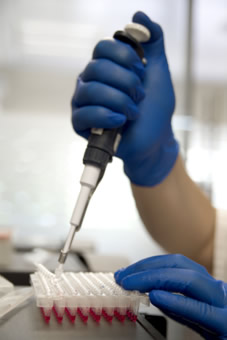HIVACAT has been licensed by the CSIC to develop a vaccine against HIV
The HIVACAT program for the development of this vaccine today announced the obtention of a license to advance in the development of a possible vaccine against HIV —the virus that causes AIDS. The license includes a vaccine candidate called "MVA-B", developed by researcher Mariano Esteban from the Spanish National Research Council (CSIC).
The agreement has been formalized by ESTEVE and the IrsiCaixa Institute for AIDS Research on behalf of HIVACAT. Research, however, will also be conducted at the Hospital Clínic de Barcelona —also part of the HIVACAT consortium.
The obtention of this license coincides with the first anniversary of the presentation in Madrid of very promising results on its efficacy as a preventive vaccine. These results were obtained in a study conducted jointly by the Hospital Clínic of Barcelona and the Gregorio Marañón Hospital of Madrid.
HIVACAT researchers are presently testing MVA-B in patients from different Spanish hospitals for use also as a therapeutic vaccine, i.e. to study its ability to stimulate HIV infection control in infected individuals without the need for medication. This study is being developed under the direction of Hospital Clínic’s researcher Felipe García and IrsiCaixa’s ICREA researcher Christian Brander, who is also HIVACAT’s Scientific Director.
 According to Mariano Esteban, researcher in charge of MVA-B development at the CSIC’s National Center of Biotechnology, “the compound has shown to be as potent as or better than vaccines currently under study. Similarly to other vaccines such as the influenza vaccine, MVA-B is based on an attenuated virus. In this case, the virus has been added with HIV genetic material so that, once injected, it may penetrate the patient’s cells and allow these to produce viral proteins. Our results have evidenced that these proteins stimulate the patient’s immune system, and that this stimulation is maintained over one year.”
According to Mariano Esteban, researcher in charge of MVA-B development at the CSIC’s National Center of Biotechnology, “the compound has shown to be as potent as or better than vaccines currently under study. Similarly to other vaccines such as the influenza vaccine, MVA-B is based on an attenuated virus. In this case, the virus has been added with HIV genetic material so that, once injected, it may penetrate the patient’s cells and allow these to produce viral proteins. Our results have evidenced that these proteins stimulate the patient’s immune system, and that this stimulation is maintained over one year.”
New studies aim to show that MVA-B can be used to trigger an immune response in already infected individuals for such a response to be able to control the amount of virus in the blood and thus make medication no longer necessary. Studies for its use as a preventive vaccine will also be continued. According to HIVACAT co-directors José Ma Gatell and Bonaventura Clotet, “the first results are expected in 2013 and will lead to Phase-II trials. However, we cannot yet predict whether the immune response observed will be able to control the infection”.
About MVA-B
Back in 1999, Esteban's research team began to work in the development and preclinical studies of MVA-B —the name comes from its composition from Modified Vaccinia Virus Ankara (MVA). MVA-B is an attenuated virus already used in the past to eradicate smallpox, and also as a model in the research of many other vaccines. The "B" stands for the HIV subtype it is meant to work against, the most common in Europe.
Development of MVA-B is based on the insertion of four HIV genes (Gag, Pol, Nef & Env) in the Vaccinia genetic sequence. A healthy immune system reacts against MVA, and HIV genes inserted into its DNA are unable to infect human beings, thus ensuring the safety of the clinical trial.
About HIVACAT
The HIVACAT AIDS vaccine research and development project is a joint public-private consortium unprecedented in Spain that brings our country to the fore of HIV and AIDS international research. Consisting of the two most important and established AIDS research centers in the country, the IrsiCaixa Institute for AIDS Research at the Germans Trias I Pujol (Can Ruti) Hospital and the AIDS and Infectious Diseases Service at Barcelona’s Hospital Clínic, HIVACAT carries out research into the development of a new vaccine against HIV in coordination with ESTEVE, and with the support of “La Caixa” Foundation, the Department of Health and the Department of Economy and Knowledge of the Generalitat de Catalunya, and the Clínic Foundation. This consortium is the first major attempt at establishing collaboration in this field between local government, researchers and companies.
The HIVACAT project is co-directed by Dr. Bonaventura Clotet (IrsiCaixa) and Dr. Josep Maria Gatell (Hospital Clínic). Both research centers are conducting research alongside more than 5,000 patients who benefit from the rapid implementation of new treatments and from innovations achieved worldwide. HIVACAT consists of a team of more than 100 scientists trained in world-renowned research centers such as the Harvard University of Boston, the Pasteur Institute of Paris, and the Royal Free Hospital of London.